New Policy in Focus magazine tackles child-sensitive social protection as a tool to curb childhood poverty
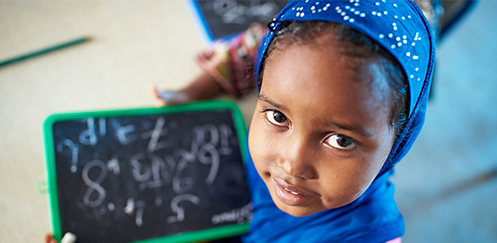
Photo: UNICEF/Noorani
Brasília, 20 December 2018 – Children account for nearly half (50.2 per cent) of the world's extremely poor population, according to recent data by the World Bank and UNICEF. The impact of poverty on children has lifelong consequences, including poor health and nutrition and low educational performance. Social protection policies can play a crucial role in addressing the multifaceted nature of child poverty and its long-term pernicious effects, improving children’s overall well-being.
Child-sensitive social protection is at the core of the new issue of the IPC-IG)s Policy in Focus magazine titled Social Protection: meeting children's rights and needs. Specialist guest editors Anna Carolina Machado and Charlotte Bilo (IPC-IG) have gathered 15 inspiring articles penned by leading scholars, researchers and policy practitioners, with diverse perspectives on key challenges faced in the promotion of social protection programmes for children in Asia, Latin America, the Middle East and sub-Saharan Africa.
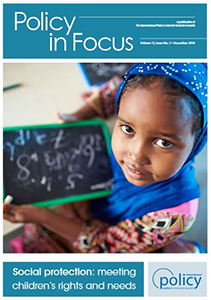
In the opening article, “Children’s rights and social protection: challenges in public policy”, Richard Morgan (Plan International) explains that it is crucial to consider children as holders of rights and to understand social protection as both an investment in human capital and an essential tool in meeting obligations to children’s rights, to help ensure that they are not excluded from progress towards humanity’s goals for 2030 and beyond.
David Stewart and Ian Orton (UNICEF) then discuss the potential of universal cash grants for tackling child poverty and its effects. In “Is it time for universal child grants?”, they lay out key arguments and point to unanswered questions and common concerns. The authors posit that universal social protection may support social cohesion by reducing inequality, while also helping garner broad political support for universalistic approaches that is sustained over generations.
In the following article, “Multidimensional child poverty analyses and child-sensitive social protection”, Chris de Neubourg (Social Policy Research Institute and Tilburg University) et al. explore how insights arising from multidimensional child poverty research—such as UNICEF’s Multiple Overlapping Deprivation Analysis (MODA) methodology—help refine the implementation of child-sensitive social protection.
In “Understanding and responding to child poverty in Iraq”, Bilal Al-Kiswani (ESCWA) and Farah Abdessamad (UNICEF Iraq) examine poverty and vulnerability in the country, where children comprise 48 per cent of the total populatiosón. Given the political, humanitarian and economic shocks in recent years, the authors argue that Iraq has suffered a substantial increase in poverty, especially among children, due to the demographic shift and high fertility rates.
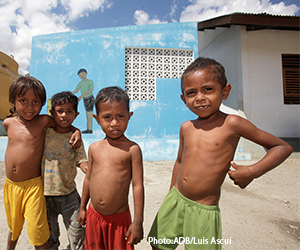
Keetie Roelen (Institute of Development Studies), in her article “Cash plus: a silver bullet for addressing children’s needs?“ examines this approach, which is rapidly gaining momentum within social protection. It recognises and aims to respond to both income and non-income constraints that prevent caregivers from meeting children’s needs. She explains that this type of intervention can reinforce the well-documented positive effects of cash transfers by providing complementary services or support.
“Cash transfers and safe transitions to adulthood: evidence, promise and gaps in sub-Saharan Africa”, by Tia Palermo (UNICEF Innocenti), discusses the multifaceted responsibility of countries facing a ‘window of opportunity’ to ensure that their demographic dividend is not wasted, ensuring that families can invest in adolescents. Enabling poor families to invest in adolescents may require new or sustained social protection programming in sub-Saharan Africa.
The potential interplay between social protection programmes and the fight against childhood violence is explored by Elena Gaia (World Vision International) in her article “Can social protection help end violence against children?” Economic and income support programmes have not been historically set up to address violence against children, nor have they included specific measurements related to it. Violence against children can be fought at a larger scale with proven interventions to be delivered and funded by other sectors alongside social protection.
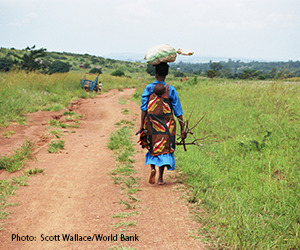
In the following article, “Accessing social assistance and special social services in Kazakhstan”, Babken Babajanian (London School of Economics) and Lucy Scott (Oxford Policy Management) discuss the barriers in accessing social protection systems in the country, such as excessive bureaucracy, lack of beneficiary awareness and ease of application, drawing on a household survey with almost 4,000 respondents from low-income districts.
“Early childhood grant in Mozambique”, by Sérgio Falange (Mozambique Civic Society Platform for Social Protection), illustrates the importance of a comprehensive social protection strategy for the introduction of new programmes or the scale-up of existing ones. The author presents a general overview of the child grants in the country and a more detailed view of the Early Childhood Grant (Subsídio de Primeira Infância—SPI) in particular.
The article “Why a ‘cash plus’ approach is critical to better support children and adolescents with disabilities: evidence from Jordan and Palestine”, by Nicola Jones (Overseas Development Institute and GAGE) et al. point out that few social protection programmes take into account the age-, gender- or context-specific vulnerabilities of children and adolescent with disabilities. The authors explore how these programmes can improve lives in humanitarian contexts, and also highlight key gaps, calling for a ‘cash plus’ approach to better support young people’s multidimensional well-being.
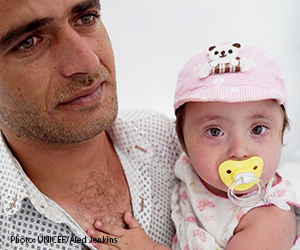
Drawing on his personal observations of the impact of social protection policy tools in humanitarian settings, Jacobus de Hoop (UNICEF Innocenti) reflects on the role of cash transfer programmes in improving the lives of children on the move in his article, “Using cash transfers to support displaced children: experiences from Jordan and Lebanon”.
In a similar vein, in “Implementing a conditional cash transfer programme for indigenous peoples in geographically isolated and disadvantages areas in the Phillipines: a demand and supply-side assessment”, Josefina N. Natividad (University of the Phillipines Diliman) analyses the results of the Pantawid Pamilyang Pilipino Program (4Ps) programme.
Wrapping up this special issue, three articles provide evidence of the impact of social protection programmes on child-related outcomes.
In “Social protection for children in Argentina: advances and future challenges”, Oscar Cetrángolo, Javier Curcio and Roxana Maurizio (Instituto Interdisciplinario de Economía Política, UBA-CONICET) identify two pillars in the country’s income transfers to households with children and adolescents—contributory family allowances and non-contributory allowances. The authors examine the challenges in consolidating a comprehensive social protection systems grounded in universal rights.
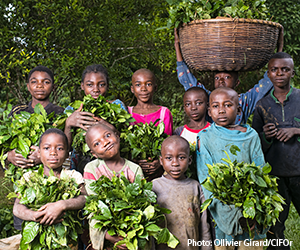
Shifting the perspective to India, in the article “Conditional cash transfer for improving nutrition outcomes: lessons from the Bihar Child Support Programme (BCSP)”, Shruti Viswanathan and Tom Newton-Lewis (Oxford Policy Management), present the key findings of the programme, created to help combat the high level of maternal and child undernutrition in Bihar, the third most populous state in India. Evidence from the BCSP suggests that maternal benefit transfers can significantly improve nutrition and health outcomes of mothers and infants.
Finally, Letícia Bartholo (Ipea and IPC-IG) and Luis Henrique Paiva (Brazil’s Ministry of Social Development) bring the issue to a conclusion with the article: “The Bolsa Família Programme and the fight against child poverty in Brazil”. The authors explain why this flagship social protection programme has played a crucial role in the childhood and adolescence of beneficiaries, leading to improvements in the life situations of the poorest populations. However, they also point out that despite significant gains, there is still much to do to overcome child poverty in Brazil.
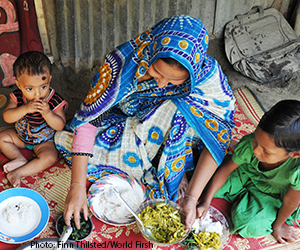
Related readings:
- One Pager Series: "Overview of non-contributory social protection programmes in the Middle East and North Africa (MENA) region though a child and equity lens" in Algeria, Bahrain, Djibouti, Egypt, Iran, Iraq, Jordan, Kuwait, Lebanon, Libya, Morocco, Oman, Palestine, Qatar, Saudi Arabia, Sudan, Syria, Tunisia, Yemen and United Arab Emirates. Find them all here, sorted by language: Arabic, English, French and Portuguese.